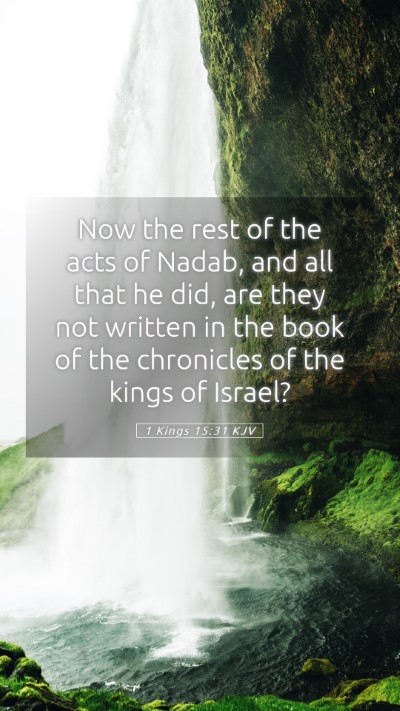Understanding 1 Kings 15:31
Verse: "Now the rest of the acts of Baasha, and what he did, and his might, are they not written in the book of the chronicles of the kings of Israel?"
This verse serves as a concise summary of the reign of King Baasha, king of Israel. In order to fully grasp the implications of this passage, we can turn to renowned public domain commentaries for deeper insights.
Bible Verse Interpretations
Matthew Henry's Commentary:
Matthew Henry emphasizes that the reference to the "acts of Baasha" points to the historical recordings found in the book of chronicles. This indicates that the deeds of kings were preserved for remembrance, suggesting that all rulers must be accountable for their actions. Furthermore, Henry notes that Baasha’s reign is marked by violent transitions and the establishment of a new dynasty, which exemplifies the turbulent nature of Israel's monarchy during this period.
Albert Barnes' Notes:
Albert Barnes highlights the importance of the chronicles as sources of historical information, which are to be consulted for the complete account of Baasha's reign. He suggests that the chronicler intended to distinguish true Israelite rule from the corruption and idolatry seen in surrounding nations. The account suggests that while Baasha was a figure of military strength and political influence, he ultimately fell short of the ideals set forth by God for His people.
Adam Clarke's Commentary:
Adam Clarke points out that this verse represents a formulaic conclusion commonly seen in historical accounts within Scripture. This indicates the closing of Baasha's narrative and transitions the reader towards the next events in the historical timeline of Israel's kings. Clarke also notes how the mentioning of the “acts” implies a concern for both details of governance and moral actions, which thereby functions as a moral overture for future generations studying these texts.
Significance of 1 Kings 15:31
The verse encapsulates the broader themes of accountability, the legacy of leadership, and the tracing of Israel's tumultuous history. Each king of Israel is often contrasted against God’s commandments and expectations, which invites readers into a deeper Bible study analysis.
Bible Study Insights
- Historical Context: Understanding Baasha's reign means looking closely at the socio-political dynamics of Israel during this era, including the ongoing conflicts with neighboring nations.
- Application to Daily Life: The message of accountability can be a call to our own moral responsibilities in leadership and influence.
- Bible Cross References:
- 1 Kings 15:16-22 - The conflict between Baasha and Asa.
- 1 Kings 14:7-10 - Prophetic judgement against Jeroboam.
- 2 Chronicles 16:1-10 - Insights into the political landscape during this time.
Conclusion
Through verses like 1 Kings 15:31, we gain critical insight into the lives of biblical figures and the implications of their actions. For those engaged in Bible study groups or seeking online Bible study resources, this verse serves as a compelling starting point for discussions on leadership, accountability, and the historical narratives in Scripture.
This analysis accompanies an essential inquiry into how to interpret Bible verses, providing a framework of understanding Scripture within its historical context, and encouraging further exploration of the meaning of Bible verses throughout the text.


